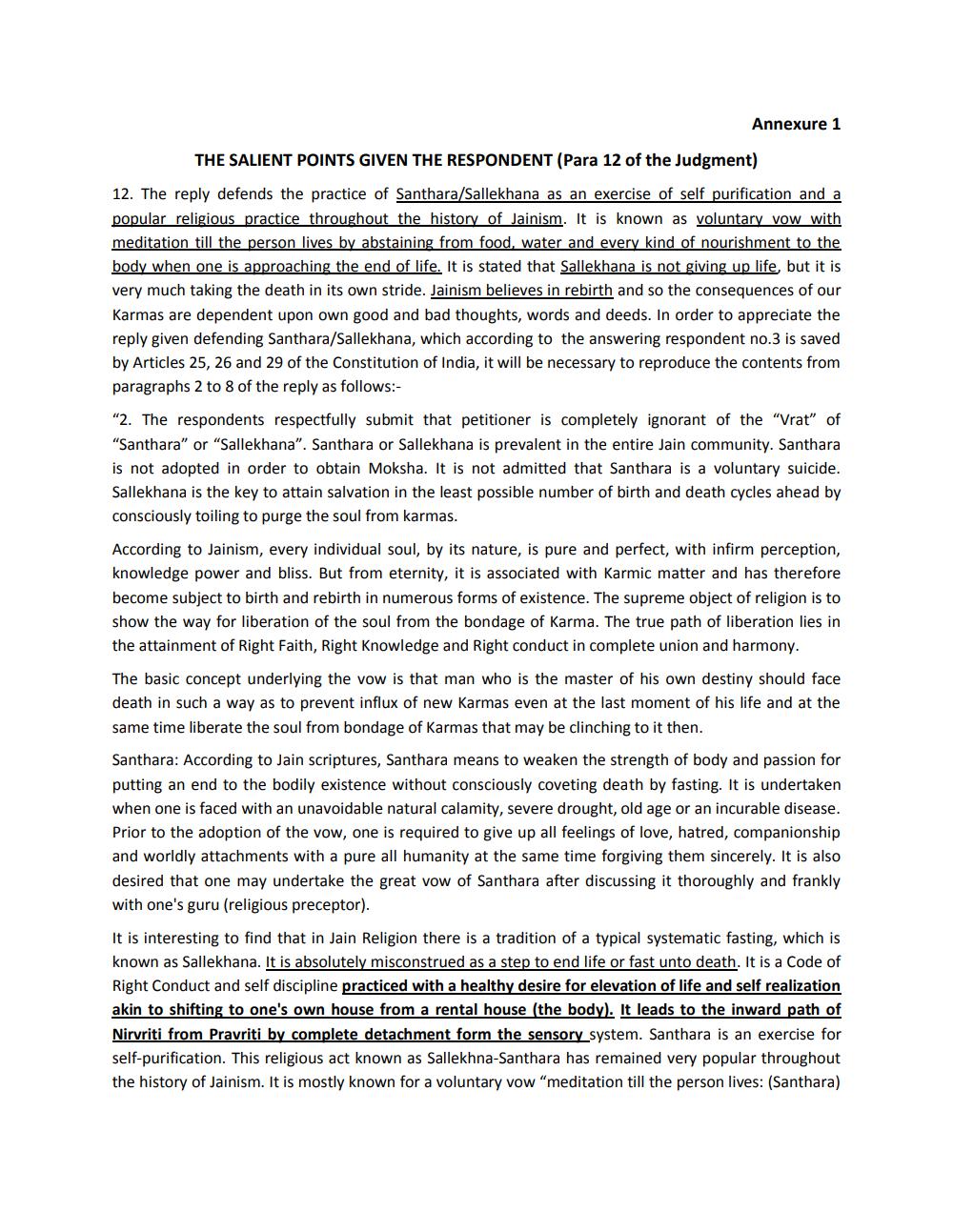________________
Annexure 1
THE SALIENT POINTS GIVEN THE RESPONDENT (Para 12 of the Judgment)
12. The reply defends the practice of Santhara/Sallekhana as an exercise of self purification and a popular religious practice throughout the history of Jainism. It is known as voluntary vow with meditation till the person lives by abstaining from food, water and every kind of nourishment to the body when one is approaching the end of life. It is stated that Sallekhana is not giving up life, but it is very much taking the death in its own stride. Jainism believes in rebirth and so the consequences of our Karmas are dependent upon own good and bad thoughts, words and deeds. In order to appreciate the reply given defending Santhara/Sallekhana, which according to the answering respondent no.3 is saved by Articles 25, 26 and 29 of the Constitution of India, it will be necessary to reproduce the contents from paragraphs 2 to 8 of the reply as follows:"2. The respondents respectfully submit that petitioner is completely ignorant of the "Vrat" of "Santhara" or "Sallekhana". Santhara or Sallekhana is prevalent in the entire Jain community. Santhara is not adopted in order to obtain Moksha. It is not admitted that Santhara is a voluntary suicide. Sallekhana is the key to attain salvation in the least possible number of birth and death cycles ahead by consciously toiling to purge the soul from karmas.
According to Jainism, every individual soul, by its nature, is pure and perfect, with infirm perception, knowledge power and bliss. But from eternity, it is associated with Karmic matter and has therefore become subject to birth and rebirth in numerous forms of existence. The supreme object of religion is to show the way for liberation of the soul from the bondage of Karma. The true path of liberation lies in the attainment of Right Faith, Right Knowledge and Right conduct in complete union and harmony.
The basic concept underlying the vow is that man who is the master of his own destiny should face death in such a way as to prevent influx of new Karmas even at the last moment of his life and at the same time liberate the soul from bondage of Karmas that may be clinching to it then. Santhara: According to Jain scriptures, Santhara means to weaken the strength of body and passion for putting an end to the bodily existence without consciously coveting death by fasting. It is undertaken when one is faced with an unavoidable natural calamity, severe drought, old age or an incurable disease. Prior to the adoption of the vow, one is required to give up all feelings of love, hatred, companionship and worldly attachments with a pure all humanity at the same time forgiving them sincerely. It is also desired that one may undertake the great vow of Santhara after discussing it thoroughly and frankly with one's guru (religious preceptor). It is interesting to find that in Jain Religion there is a tradition of a typical systematic fasting, which is known as Sallekhana. It is absolutely misconstrued as a step to end life or fast unto death. It is a Code of Right Conduct and self discipline practiced with a healthy desire for elevation of life and self realization akin to shifting to one's own house from a rental house (the body. It leads to the inward path of Nirvriti from Pravriti by complete detachment form the sensory_system. Santhara is an exercise for self-purification. This religious act known as Sallekhna-Santhara has remained very popular throughout the history of Jainism. It is mostly known for a voluntary vow "meditation till the person lives: (Santhara)




